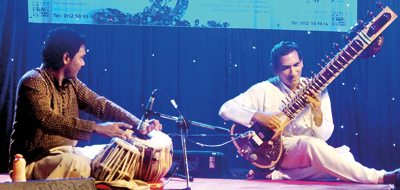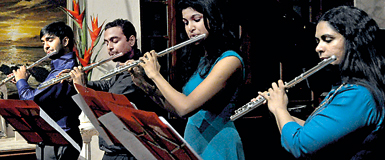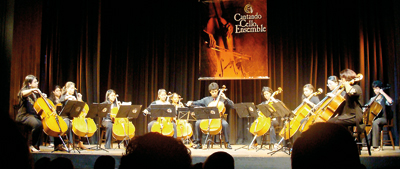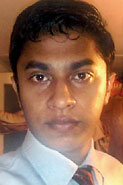World music with a French accent
Full to overflowing would describe the French Spring festival, which, like those two other bulging cultural-treat hampers, the Galle Literary Festival and the Art Biennale, served up more goodies than any one person could possibly consume.

Peshala Manoj on tabla, Pradeep Ratnayake on sitar, and Abaji on an assortment of exotic stringed instruments.Photos: Mangala Weerasekera
The 10-day festival (June 15 to 24), presented by the Alliance Francaise de Kotte, covered music, literature, photography, art, dance, theatre, and cinema, and even spilled out on to the street to include architecture and street art. There was also “gastronomie” (food presented as a part of culture). Such abundance meant that you had to limit your choices. Some of us could fit in only a couple of events, like the opening day’s thrilling sitar, tabla and guitar recital, and a sober classical concert of string quartet music two days later.
The Friday, June 15 concert, held in the tent-like open-air theatre at the back of the BMICH, featured visiting musician Abaji teaming up with sitar exponent Pradeep Ratnayake and tabla virtuoso Peshala Manoj. The instruments conducted an intriguing conversation in North Indian and Middle tern musical accents, an exchange between East and Near East.
The evening began with sitar and tabla performing a “romantic raga pancham se gara, with Western and bluesy inflections”, as sitar player Pradeep Ratnayake described it to us after the concert. Next on was the amiable Abaji, a Lebanese-born French citizen who speaks and sings in French, Arabic, Turkish, Greek and Armenian.
Abaji is a jack of all exotic stringed instruments, especially from around the Asia Minor region. Right through the evening he kept pulling out one curious-looking stringed object after another. The first was what he called a “guitar-lute”, one of his own creations, and in the course of an evocative strumming solo he broke into non-verbal song, a startling and piercing melodious howl aimed straight at the heavens. It was like being flung into another world – strange, wild, haunting, luminous.
The dazzling improvisations followed as solos and instrumental combinations. The deeply expressive “Anatolia”, a duet by Abaji and Pradeep Ratnayake, with Peshala Manoj discreetly commenting on tabla, was the emotional climax of the evening for many of us in the audience.
This was a thrilling, adventurous, joy-giving evening, a journey to unfamiliar regions of world music in the company of three consummate artists.
Beethoven and Cesar Franck
Two nights later we were at the Lionel Wendt Memorial Theatre, this time to hear visiting French violinist Frédéric Pelassy, along with Ananda Dabare (violin), Avanti Perera (viola), and Dushyanthi Perera (cello), playing two works, the Beethoven String Quartet No. 9, in C, and, to give the programme a French presence, the monumental String Quartet in D by César Franck. Almost certainly the Franck was being performed for the first time in this country.
There might have been people in the audience that evening who remembered another chamber music concert, given in the early ’70s, at the same venue, which also carried a monumental César Franck work, the Piano Quintet in F minor, and that too might well have been the first public performance of the work in this country. The heavyweight programme included the Dvorák Piano Quintet in A and one of the Fauré Piano Quintets.
That concert too, which the music critic, the late Karel Roberts, described as “surely one of the finest chamber music concerts given in this country in recent years”, featured a visiting artist performing with local musicians. They were the New Zealand concert pianist, the late Peter Cooper, and members of The Philharmonia Players (Wendy Jackson-Miller, cello; Carmel Raffel, viola; and Evangeline de Fonseka and Eileen Prins, violins).
That resounding performance of more than four decades ago was very much in our thoughts as we leaned forward to hear the Sunday, June 17 concert.
The violinist Pelassy had made a good choice for himself by opening the evening with the César Franck. In the first movement the first violin has the upper hand, so to speak, and the stage pretty much to himself. He dominates the melodic line for a good 154 measures. Pelassy could have made more of his opportunity, but once the ensemble got going, the playing gained strength overall, and the players meshed well. This was serious, mature music, and the focused performers took their roles very seriously. The Beethoven, which came after the interval, worked creditably, with the mood lightened in the last movement when Pelassy snapped a string, forcing the quartet to leave the stage until the string was replaced.
The interruption was a bonus for the unusually attentive audience, which got to hear the last movement twice over.
One unfortunate lapse must be mentioned: the audience was misled into thinking it was hearing Beethoven when it was hearing César Franck, and vice versa. The printed programme listed Beethoven first, César Franck second, which made chronological sense; the two works are 81 years apart, the Beethoven Quartet in C was published in 1808, while the César Franck Quartet in D was composed in 1889. No announcement was made that the programme order would be reversed.
There were music fans and students with a knowledge of Beethoven who left the hall not a little puzzled, and there were others eager to learn about Western classical music who were unaware that they had been misguided.
In October last year, a string quartet from France gave a concert at the Galle Face Hotel. The programme listed Schubert’s String Quartet No. 7, in D (D 94), but the musicians in fact performed Schubert’s String Quartet No. 9, in G minor (D 173). On that occasion too, no announcement was made about a last-minute programme change. In the audience was a Schubertian (and a writer for another publication) who brought the discrepancy to our attention. It is de rigueur that audiences be informed about programme changes. Coincidentally, both concerts were presented by the same team of cultural promoters . Oh lŕ lŕ.
comments powered by Disqus



















